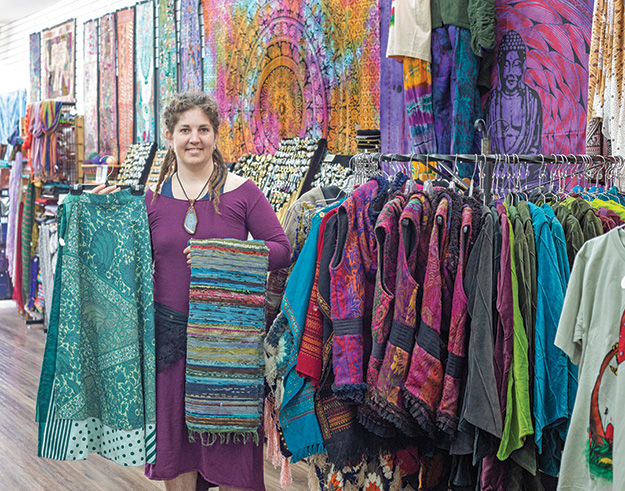By Terri Smith –
By now you must have heard of “slow fashion,” but do you really know what it is? In case you’re not sure, here is a great explanation from www.thesustainableedit.com.
“Slow Fashion” means:
- quality over quantity
- caring for the environment
- protecting human rights
- conscious buying and thoughtful purchases

Slow fashion isn’t about never buying new clothes; rather, it’s about making more informed, thoughtful decisions about our purchases.
If you’re trying to make better-informed decisions about your clothing purchases, Felice Trotter-Wanner, owner of “My Own Collection,” and her team can help. For over 10 years now she has been working on slow fashion—probably before it was even a thing.
Felice is her own importer. Once a year she travels to India to meet with her suppliers and make decisions about what she will be importing this year. She says she doesn’t feel great about flying that much, but I think when you consider how much most people in the fashion industry fly, or how often and how much is shipped to big box stores, it isn’t really much at all. Because she is her own importer, she gets to inspect the quality herself, and she can also make decisions and requests that a larger company would not be able to manage.
“Because I am there, on the ground, I can get the exporter to package everything as efficiently as possible,” she says.“I can eliminate as much plastic as possible from the packaging of these products and be sure that they fit as much as they possibly can into a shipment.”
Every garment we buy in a store is usually shipped individually wrapped in plastic. Most people are not even aware of how much plastic our clothing generates. Felice has been working with her suppliers to have as much as possible put into repurposed sari cloth bags that she then reuses in her store for storage or for customers. And if you have shopped here, you already know and love these cloth bags.
Because she does go back year after year, she also gets to make informed decisions about who she buys from.
“I’ve never claimed to be ‘fair trade,’ because I’ve never tried to make it an official thing,” she says. “But I follow my gut on which suppliers are the good ones. I go back to people who employ the same people and pay them a living wage, people who care about their staff and about their community. One of my main exporters recently paid for an operation for a young boy in the community. They are community-minded, and so I continue to work with them. I get to see the people who are working for my suppliers. I get to see what their jobs are like. If I don’t like the feeling I get from someone about how they do business, how they treat their staff and community, I don’t go back to them.”
Back here in Canada, she also pays her own staff a living wage and values them immensely, “I couldn’t do it without them!” she tells me.
Quality is important to Felice, and so is a lack of waste. She wants the clothing she sells to last. She also doesn’t just pull “end-of-season” clothes off the racks to throw away. If something doesn’t sell one season, she may put it on sale or store it for awhile and then put it out for sale again later. My Own Collection also carries fun and popular “mystery bags” that contain $30 worth of mystery items for $15 which makes for a fun shopping experience and helps to keep inventory moving.
If you are looking for slow fashion, “avoid large name brands that always seem to have new designs every season, because last season’s designs are probably out back in the dumpster,” she says. “Some companies will even destroy old designs before throwing them out so they can’t be reused.”
Felice doesn’t believe in seasonal fashion. She believes in “fashion for your style” and that we should all have favourite clothes that we love for years until there is nothing left of them. This is the reason quality control is so important to her. She wants customers to be able to buy items from her store knowing they will last.
And they do last! My Own Collection is one of the few places I actually buy new clothing and I still wear the skirts, dresses, and vests I purchased seven or eight years ago. In a world where so much is so disposable, it’s wonderful to find well-made products sold by someone who really cares.
An erstwhile market gardener and mother of goat, Terri lives on a small farm near Quesnel, BC. There she gardens, makes art, writes about local food, teaches workshops, and works at Long Table Grocery as Guardian of the Vegetables.


